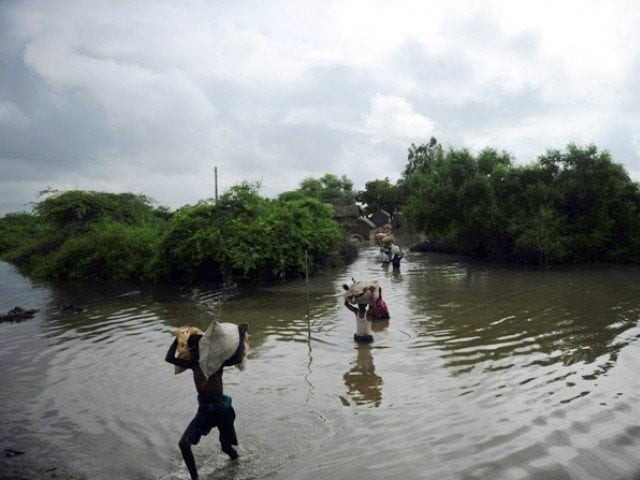Policy implementation: ‘Climate change authority needed to oversee goals’
Poor coordination, low allocation hurdles in policy implementation: commission

Poor coordination, low allocation hurdles in policy implementation: commission.
PHOTO: AFP
The government has had a Climate Change Policy since 2012 but its implementation is lacking, a report produced by a commission formed by the Lahore Court says. The report calls for a permanent climate change authority to coordinate between various departments in this regard.
“The glass of implementation of the framework, and priority actions in particular, appears half-full.” The report says priority actions outlined in the implementation framework formed in 2013 were meant to be completed in two years.
Findings
According to the report, 11 of the 42 priority action targets for water resource management have been met. The report adds that most of the projects initiated for this purpose were conceived before the climate change policy was drawn. The report notes that implementation of water resource management policies was not exclusively under the climate change policy. In the agriculture sector, only six of 43 priority actions were completed by December 2015. The commission noted that, “work on many of these priority actions is an ongoing process which the Department of Agriculture is continuously undertaking.”
The report highlights violations by state officials of the climate change policy under biodiversity and forestry goals.
“There were violations of laws and policies by the state itself, especially regarding hunting of migratory birds. These issues need to be taken care of so that a sanctuary is available for migratory birds. These measures are vital to encourage biodiversity.”
The report highlighted 41 priority actions dealing with forests, wildlife and biodiversity in the country, of which 30 pertained to forests, four for biodiversity and seven related to wetlands. It was noted there were no priority actions regarding wildlife under the framework. As of December 2015, 22 priority actions under the framework had been completed.
The report noted that though there had been some progress on priority actions for disaster management, five of the priority actions had been ignored. Out of 29 priority actions, 24 had been met. The report noted that poor infrastructure at the district level impeded disaster management. “The federal and provincial governments can only plan and, at best, be present at major calamities but on a day-to-day basis, the district disaster management agencies are the ones which need to function effectively.”The report states that there was a need to raise awareness on issues related to disaster management. “The National Disaster Management Authority chairman also emphasised that early warning systems should be modernised; response mechanisms at lower tiers be strengthened and awareness should be raised by making disaster management a part of curriculum at schools level,” the report says.
In the energy sector, 10 of 22 priority actions were completed by the end of December 2015.
Recommendations
The report notes lack of interest and awareness within government departments and ministries on issues related to climate change. It said that a large number of these projects had been conceived before the policy was drawn. “Instead of falling prey to a false sense of accomplishment, there should be a concerted effort on climate-proofing these projects,” the report states.
The commission expressed the need to revise PC-1 for projects and include climate concerns. The report recommends that projects being carried out as part of the development agenda be linked to climate change priorities and made compatible with the environment policy. The report also notes lack of government funding for issues related to climate change. The report says there is an impression that a large number of projects related to climate change were supported by micro-finance schemes or bilateral agreements.
It calls budgetary allocations the biggest obstacle in implementation of climate change projects. The report also notes lack of coordination at all levels where implementation of climate change policy is concerned.
“During meetings of the commission, it became apparent that there was a lack of co-ordination between not only the federal and provincial governments but also between various ministries and departments, both at the federal and provincial levels,” it states.
The report says a permanent body in the form of a climate change authority would go a long way to help coordination.
The commission was chaired by Parvez Hassan, senior Supreme Court advocate, and had 30 members. These included members of non-governmental organisations and secretaries and representatives of ministries and departments. The commission was formulated by the Lahore High Court after a petition submitted by Asghar Leghari citing a lack of implementation on the climate change policy despite an increasing impact of changing climate patterns in the country.
Published in The Express Tribune, January 23rd, 2016.



















COMMENTS
Comments are moderated and generally will be posted if they are on-topic and not abusive.
For more information, please see our Comments FAQ